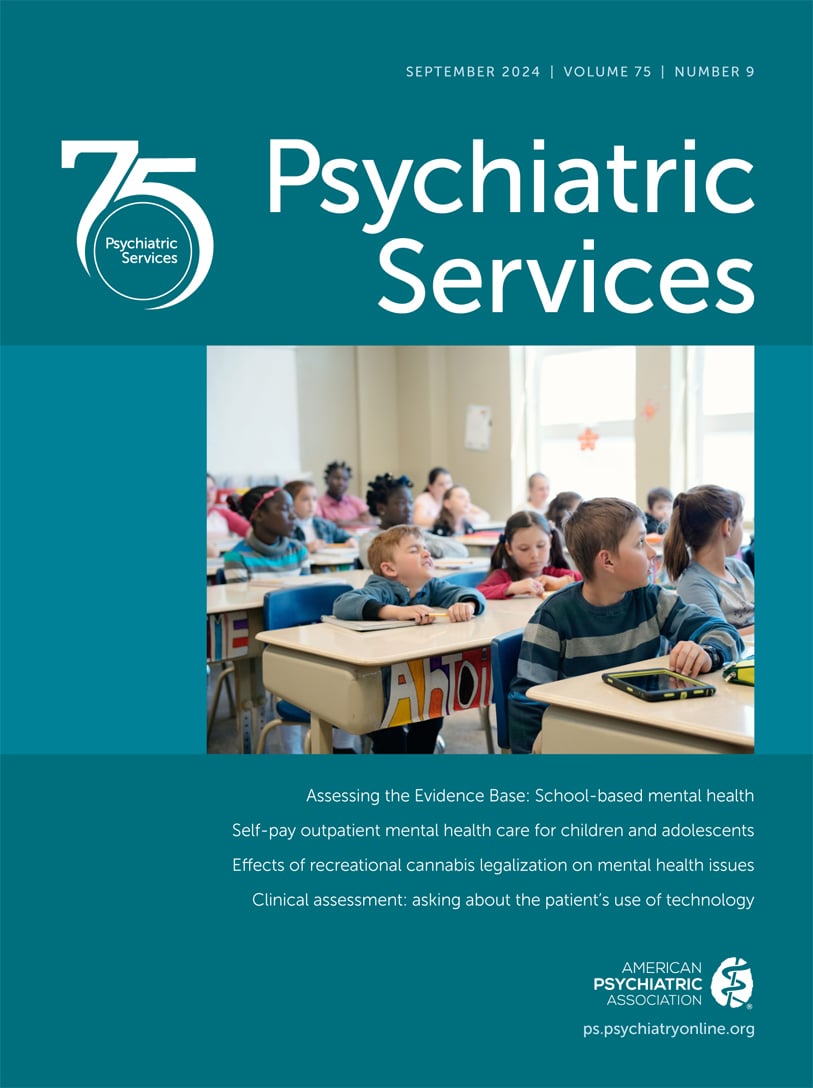Psychiatric Services
- Volume 70
- Number 1
- January 2019
Taking Issue
Commentary
Viewpoint
Articles
Publication date: 30 October 2018
Pages11–18Objective: The purpose of this study was to identify the mechanisms through which different aspects of leadership affect mental health practitioners’ attitudes toward supervisory feedback. Methods: Data were collected from 363 practitioners nested in 68 ...
https://doi.org/10.1176/appi.ps.201800164Publication date: 24 October 2018
Pages19–25Objective: Many adults with serious mental illness have significant medical illness burden and poor illness self-management. In this study, the authors examined Living Well, a group-based illness self-management intervention for adults with serious mental ...
https://doi.org/10.1176/appi.ps.201800162Publication date: 30 October 2018
Pages26–34Objective: Attention-deficit/hyperactivity disorder (ADHD) is the most common neurodevelopmental disorder of childhood. Clinical guidelines recommend behavior therapy as the first-line treatment for preschool-age children with ADHD. This study evaluated ...
https://doi.org/10.1176/appi.ps.201800204Publication date: 20 November 2018
Pages35–39Objective: Privately insured individuals frequently use out-of-network psychiatrists. Yet, whether treatment provided by psychiatrists who do not accept private insurance differs from treatment provided by those who do has not been studied. The ...
https://doi.org/10.1176/appi.ps.201800014Publication date: 20 November 2018
Pages40–45Objective: The authors sought to understand why patients may not report suicidal ideation at a health care visit prior to a suicide attempt. Methods: Electronic health record data from Kaiser Permanente Washington were used to identify patients who reported ...
https://doi.org/10.1176/appi.ps.201800342Reviews & Overviews
Publication date: 18 October 2018
Pages46–59Objective: Emerging evidence for Open Dialogue (OD) has generated considerable interest. Evidence comes from a range of methodologies (case study, qualitative, and naturalistic designs), which have not been synthesized as a whole. The objective of this ...
https://doi.org/10.1176/appi.ps.201800236Brief Reports
Publication date: 05 November 2018
Pages60–63Objective: This study aimed to document population-level trends in mental health service utilization by college students. Methods: The study drew on 10 years of data from the Healthy Minds Study, an annual Web-based survey, with a sample comprising 155,026 ...
https://doi.org/10.1176/appi.ps.201800332Open Forum
Publication date: 18 October 2018
Pages65–67Transgender people who experience serious mental illness represent a uniquely vulnerable population. Because of limited research, however, recommendations for treating this population are scarce. In this article, the authors describe the challenge of ...
https://doi.org/10.1176/appi.ps.201800232Publication date: 18 October 2018
Pages68–70Reports on the behavioral health workforce highlight the need to enhance evidence-based capacity; evidence-based interventions incorporated into pre-service graduate curricula (coursework and fieldwork) are needed to meet this goal. Improving educational ...
https://doi.org/10.1176/appi.ps.201800220Technology in Mental Health
Publication date: 10 October 2018
Pages71–74Recent advances in statistical methods and computing power have improved the ability to predict risks associated with mental illness with more efficiency and accuracy. However, integrating statistical prediction into a clinical setting poses new ...
https://doi.org/10.1176/appi.ps.201800242Law & Psychiatry
Publication date: 05 November 2018
Pages75–77Many states have adopted risk-based, preemptive gun removal laws to reduce gun violence. In this column, the authors describe the general structure of these laws, consider arguments for and against them, and briefly review the evidence regarding their ...
https://doi.org/10.1176/appi.ps.201800418Integrated Care
Publication date: 17 September 2018
Pages78–81The collaborative care model can deliver high-quality mental health care. In rural regions, clinical supervision is conducted remotely rather than in person. The authors implemented a remote teleconsultation model in rural Nepal, where the consulting ...
https://doi.org/10.1176/appi.ps.201800273Global Mental Health Reforms
Publication date: 18 October 2018
Pages82–84Peru secured a legislative advance for mental health care with a 2012 law mandating that mental health services be available in primary care. One of the main challenges faced by this reform is implementation in remote regions. This column describes a ...
https://doi.org/10.1176/appi.ps.201800079Past Issues
View Issues Archive
Vol. 75 | No. 12

Vol. 75 | No. 11

Vol. 75 | No. 10
